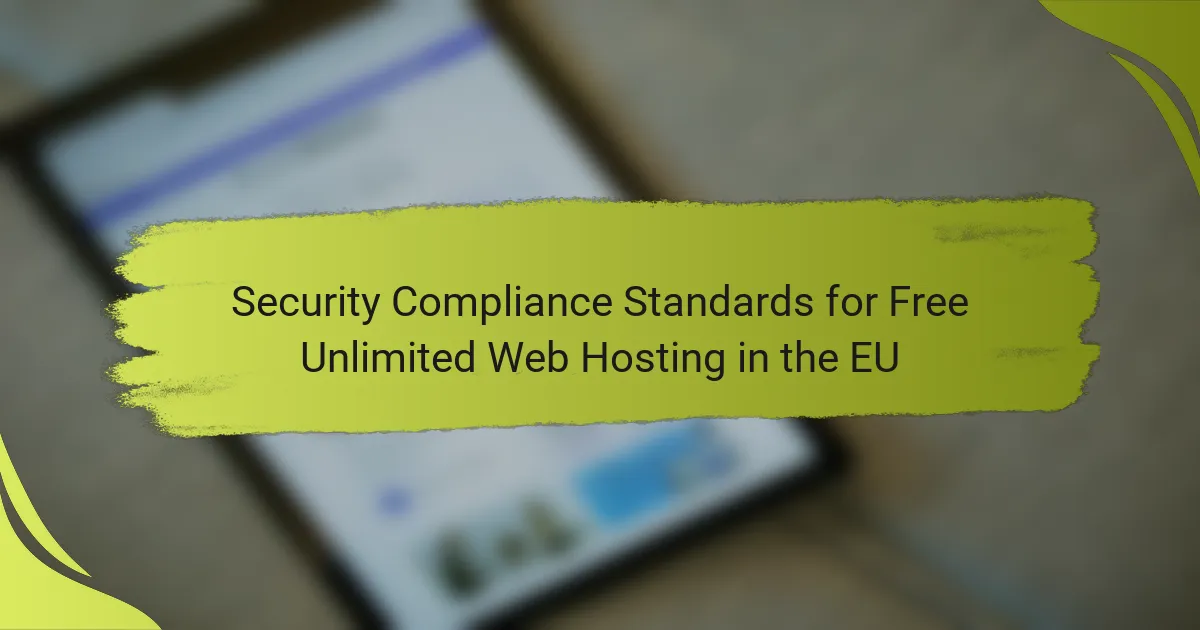Security compliance standards for free unlimited web hosting in the EU are crucial for safeguarding user data and ensuring secure transactions. Key regulations such as the GDPR, PCI DSS, and ISO/IEC 27001 certification play a vital role in maintaining these standards. Selecting a compliant hosting provider is essential to protect user information and adhere to local regulations, as non-compliance can lead to serious legal and reputational consequences.
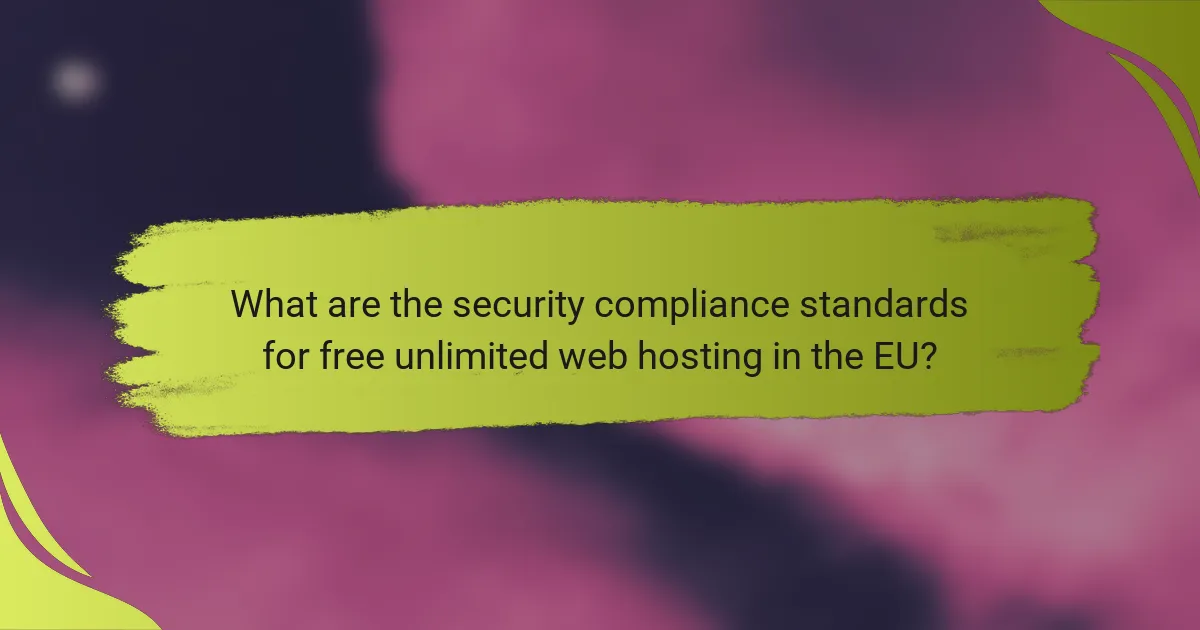
What are the security compliance standards for free unlimited web hosting in the EU?
Security compliance standards for free unlimited web hosting in the EU primarily focus on protecting user data and ensuring secure transactions. Key regulations include the General Data Protection Regulation (GDPR), the Payment Card Industry Data Security Standard (PCI DSS), and ISO/IEC 27001 certification, each addressing different aspects of security and data protection.
General Data Protection Regulation (GDPR)
The GDPR is a comprehensive regulation that governs data protection and privacy for individuals within the European Union. It mandates that web hosting providers implement strict measures to safeguard personal data, including obtaining explicit consent from users before processing their information.
To comply with GDPR, hosting services must ensure data is stored securely, provide users with access to their data, and allow them to request deletion. Non-compliance can result in hefty fines, so it is crucial for providers to have clear privacy policies and data handling procedures in place.
Payment Card Industry Data Security Standard (PCI DSS)
The PCI DSS is a set of security standards designed to protect card information during and after a financial transaction. For web hosting services that handle online payments, compliance with PCI DSS is essential to prevent data breaches and fraud.
Key requirements include maintaining a secure network, implementing strong access control measures, and regularly monitoring and testing networks. Hosting providers must ensure that their systems are capable of securely processing payment information to avoid potential liabilities.
ISO/IEC 27001 Certification
ISO/IEC 27001 is an international standard that specifies requirements for establishing, implementing, maintaining, and continually improving an information security management system (ISMS). Achieving this certification demonstrates a commitment to managing sensitive information securely.
For free unlimited web hosting providers, obtaining ISO/IEC 27001 certification can enhance credibility and trust among users. It involves conducting risk assessments, implementing security controls, and regularly reviewing and updating security policies to address emerging threats.
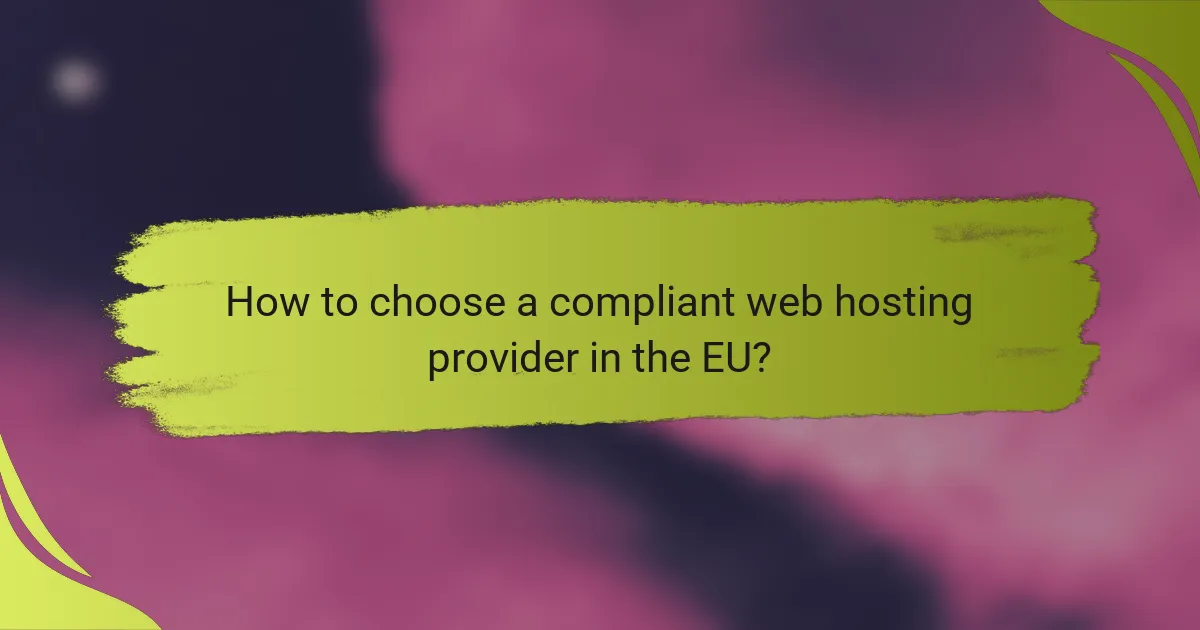
How to choose a compliant web hosting provider in the EU?
Choosing a compliant web hosting provider in the EU involves ensuring that the provider meets essential security and privacy standards, particularly GDPR and PCI DSS. Look for features that protect user data and maintain compliance with local regulations.
Evaluate GDPR compliance features
GDPR compliance is crucial for any web hosting provider operating in the EU. Ensure the provider has clear data processing agreements, allows for data subject rights, and provides transparency regarding data collection and usage.
Check if the hosting service offers features like data access logs, user consent management, and the ability to delete or export personal data. These elements are essential for maintaining compliance and protecting user privacy.
Check for PCI DSS adherence
For businesses handling credit card transactions, PCI DSS adherence is vital. This standard ensures that the hosting provider implements necessary security measures to protect cardholder data during processing and storage.
Look for features such as secure payment gateways, encryption, and regular security assessments. A compliant provider will typically display their PCI DSS certification, which can help you verify their commitment to security.
Assess data encryption practices
Data encryption is a key aspect of security compliance. Ensure that the web hosting provider uses strong encryption protocols for data in transit and at rest to protect sensitive information from unauthorized access.
Check if the provider offers SSL certificates for secure connections and encryption for databases. This can significantly reduce the risk of data breaches and enhance overall security posture.

What are the risks of non-compliance with security standards?
Non-compliance with security standards can lead to significant risks, including legal repercussions, loss of customer trust, and severe data breaches. These risks can have lasting impacts on a business’s reputation and financial stability, especially in the EU where regulations are stringent.
Legal penalties and fines
Failure to comply with security standards can result in hefty legal penalties and fines. In the EU, the General Data Protection Regulation (GDPR) imposes fines that can reach up to 4% of a company’s annual global turnover or €20 million, whichever is higher. Businesses must ensure they adhere to these regulations to avoid such financial repercussions.
Additionally, non-compliance may lead to legal actions from affected customers or stakeholders, further complicating the financial and operational landscape for the business. Regular audits and compliance checks can help mitigate these risks.
Loss of customer trust
Non-compliance can severely damage customer trust, which is crucial for any business. Customers expect their data to be handled securely, and any breach or non-compliance can lead to a loss of confidence. This can result in decreased customer loyalty and a decline in new customer acquisition.
To rebuild trust, businesses may need to invest in transparency initiatives, such as clear communication about data handling practices and compliance efforts. Engaging with customers through regular updates can also help restore confidence.
Data breaches and their consequences
Data breaches are one of the most severe consequences of non-compliance with security standards. These breaches can expose sensitive customer information, leading to identity theft and financial loss for individuals. The fallout from a data breach can be devastating, including legal fees, compensation claims, and increased scrutiny from regulators.
Moreover, the long-term impact of a data breach can include a tarnished brand reputation and reduced market share. Implementing robust security measures and regular training for employees can significantly reduce the risk of data breaches and their associated consequences.
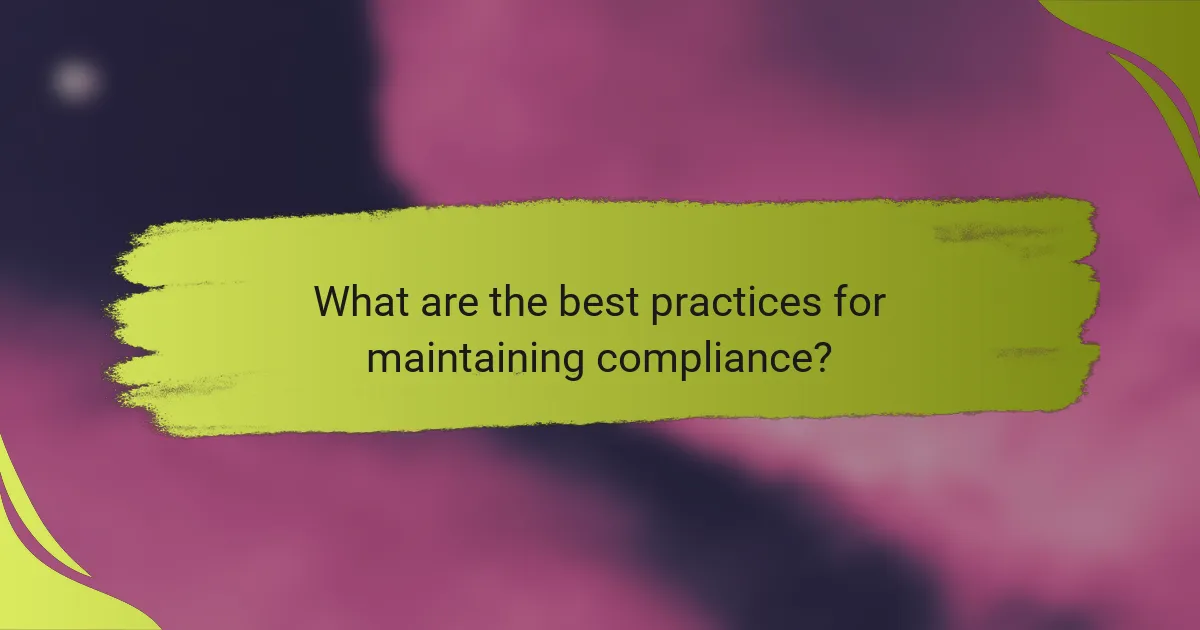
What are the best practices for maintaining compliance?
Maintaining compliance in free unlimited web hosting in the EU involves implementing effective security measures and adhering to relevant regulations. Key practices include conducting regular audits, training staff on data protection, and establishing strong access controls.
Regular security audits
Regular security audits are essential for identifying vulnerabilities and ensuring compliance with security standards. These audits should be conducted at least annually, but more frequent assessments may be necessary depending on the sensitivity of the data being handled.
During an audit, evaluate the security policies, procedures, and technical controls in place. Consider using third-party services for an unbiased assessment, and ensure that any findings are addressed promptly to mitigate risks.
Data protection training for staff
Data protection training for staff is crucial to ensure that all employees understand their roles in maintaining compliance. Training should cover topics such as data handling practices, recognizing phishing attempts, and the importance of safeguarding personal information.
Implement regular training sessions and refreshers, especially when there are updates to regulations or company policies. Encourage a culture of security awareness, where employees feel responsible for protecting sensitive data.
Implementing robust access controls
Implementing robust access controls helps to limit data exposure to authorized personnel only. Use role-based access controls (RBAC) to ensure that employees only have access to the information necessary for their job functions.
Consider employing multi-factor authentication (MFA) for an added layer of security. Regularly review access permissions and revoke access for employees who no longer require it, such as those who have changed roles or left the organization.
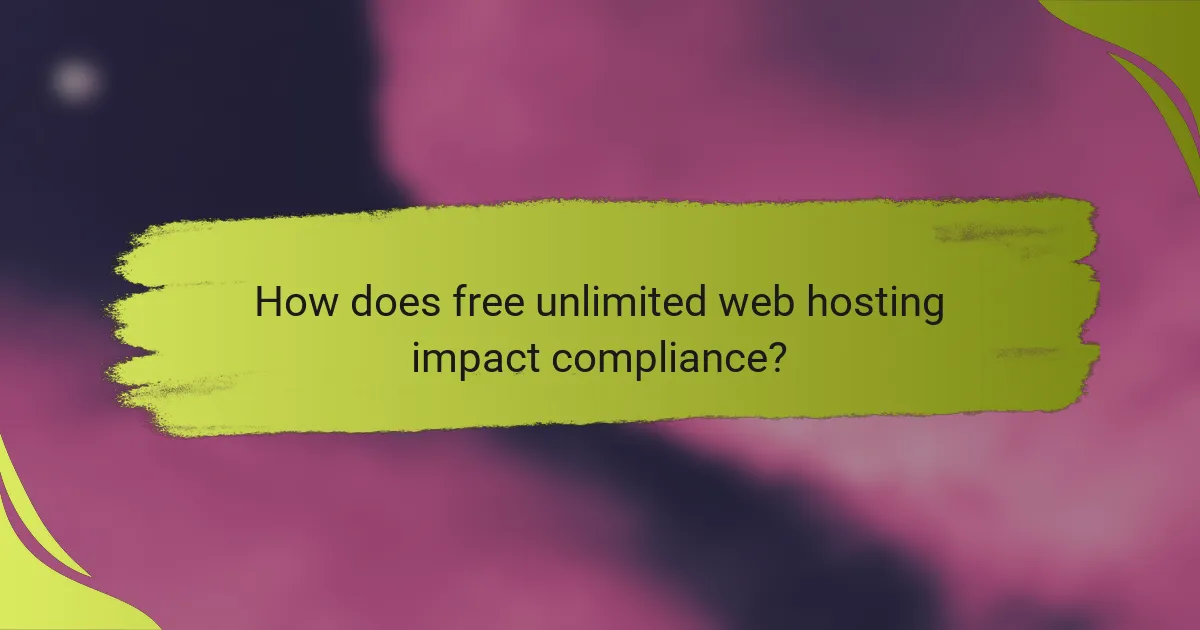
How does free unlimited web hosting impact compliance?
Free unlimited web hosting can complicate compliance with security standards due to potential limitations in resources and support. While appealing for budget-conscious users, these services often lack the robust security features necessary to meet stringent regulations like GDPR.
Potential limitations on security features
Free unlimited web hosting services typically offer basic security features, which may not be sufficient for compliance with security standards. Users might find limited options for encryption, firewalls, and intrusion detection systems, making it challenging to protect sensitive data.
Additionally, these providers may not offer regular security updates or patches, leaving websites vulnerable to attacks. Without adequate security measures, businesses risk non-compliance and potential fines under regulations such as GDPR.
Shared resources and security risks
Many free hosting services operate on shared servers, which can increase security risks. When multiple websites share the same resources, a vulnerability in one site can potentially compromise others, making it difficult to ensure data protection.
This shared environment can lead to slower response times for security incidents and less control over security protocols. Users must be cautious and consider the implications of shared resources on their compliance obligations.
Compliance support from hosting providers
While some free hosting providers may offer basic compliance support, it is often minimal compared to paid services. Users should verify whether the provider has any certifications or compliance frameworks in place to ensure they meet necessary regulations.
It’s advisable to seek out hosting services that provide clear documentation and support for compliance-related issues. This can include guidance on data protection measures and assistance with audits, which are crucial for maintaining compliance in the EU.
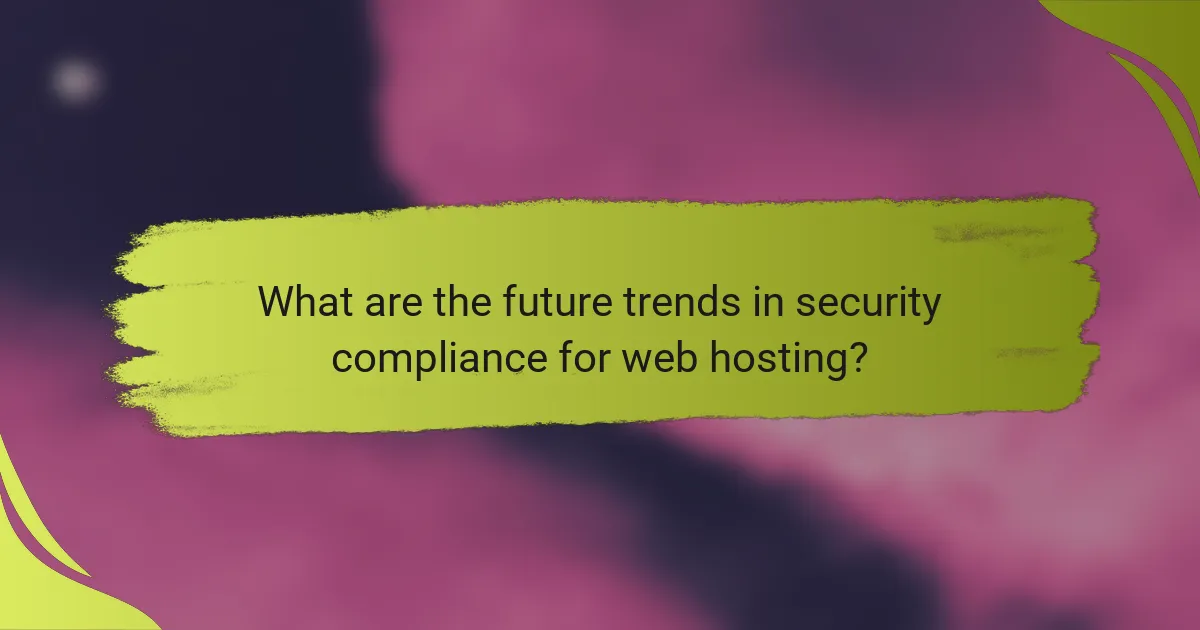
What are the future trends in security compliance for web hosting?
Future trends in security compliance for web hosting are increasingly focused on enhanced data protection, transparency, and regulatory adherence. As cyber threats evolve, web hosting providers in the EU are adopting stricter compliance measures to safeguard user data and meet legal requirements.
Increased focus on data privacy regulations
Data privacy regulations, particularly the General Data Protection Regulation (GDPR), are shaping the compliance landscape for web hosting. Providers must implement robust data protection measures, including encryption and access controls, to ensure user data is handled responsibly. This trend is likely to intensify as regulatory bodies enhance enforcement mechanisms.
Web hosting companies will need to regularly audit their compliance practices and update their policies to align with evolving regulations. Failure to comply can result in significant fines and reputational damage, making it crucial for businesses to stay informed about regulatory changes.
Adoption of advanced security technologies
Web hosting providers are increasingly adopting advanced security technologies such as artificial intelligence and machine learning to enhance compliance. These technologies can help detect anomalies and potential breaches in real-time, allowing for quicker responses to security threats. This proactive approach is essential for maintaining compliance and protecting sensitive data.
Additionally, the integration of automated compliance tools can streamline the process of meeting regulatory requirements, reducing the administrative burden on hosting providers. Companies should evaluate these technologies to improve their security posture and compliance efficiency.
Emphasis on transparency and accountability
Transparency and accountability are becoming critical components of security compliance in web hosting. Providers are expected to clearly communicate their security practices and compliance measures to customers. This includes providing detailed information about data handling, incident response protocols, and third-party partnerships.
By fostering transparency, web hosting companies can build trust with their clients and demonstrate their commitment to data protection. Regular reporting and updates on compliance status can further enhance accountability and reassure customers about the security of their data.
